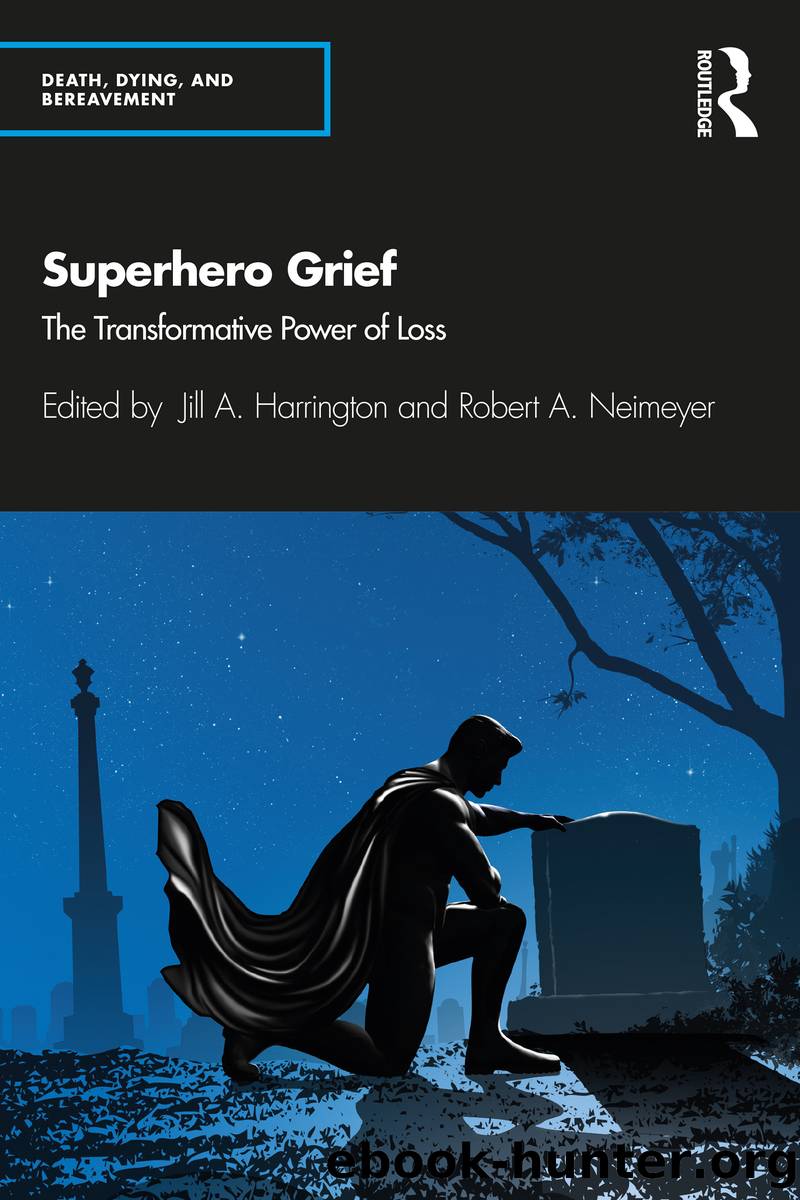Superhero Grief by Unknown

Author:Unknown
Language: eng
Format: epub
ISBN: 9780429615214
Publisher: Taylor and Francis
Published: 2020-12-01T03:02:16+00:00
21.2Clinical Considerations
There are a number of things that we should consider when we think about the relationship between the bereaved and their experiences with continuing bonds.
Nature of the Death. The death of a spouse is deeply recognized as a heartbreaking and distressing event, in which oneâs pledged lifelong companion is taken and exchanged for a cruel collection of losses; thereupon the grief suffered by one whose spouse has been murdered in a familial homicide is certainly unparalleled to some of the most tragic human experiences. The emotional tasks of a normal grieving process are often unavoidably compounded by the intensity and complexity of the bereavement due to the sudden and violent nature of the death (Currier, Holland, & Neimeyer, 2006). While it is never really quite discussed in the comics or films, Katana, having been racked with the anguish of such traumatic loss, would have been at a high risk for developing posttraumatic stress disorder (PTSD) or complicated grief (Kaltman & Bonanno, 2003).
Culture of the Bereaved. While one may be quick to wonder if Katanaâs expressions of continuing bonds are really unhealthy manifestations of PTSD or complicated grief, it is important to consider her culture in Japan. The Japanese in general do not regard death as the finality of oneâs existence and have many complex rituals and traditions that focus on continuity after death. Serious considerations are placed on posthumous security and comfort, even as myriad changes are being made to traditional rituals. The Japanese hold strong to the belief that the living and the dead continue to be connected, with special festivals dedicated to specific days in which the dead return to visit the living (Tsuji, 2011). With this understanding of the Japanese peopleâs attitudes toward dying and the deceased, it is then perhaps not particularly alarming that Katana accepts the notion that her husbandâs soul is trapped in a sword and communicates regularly with her.
Social Context of the Loss. While the loss of a spouse is recognized as something deeply painful, many such losses often occur later in life, and grief processes are traditionally discussed with respect to older spouses. However, losing a partner at a younger age could result in further long-term and complex losses, such as a financial burden due to a loss of income, having to raise children alone, and unanticipated loneliness, which can exacerbate grief processes. Young bereaved spouses could also sometimes experience disenfranchised grief, with society expecting them to move on, enter new relationships, and eventually remarry (Bar-Nadav & Rubin, 2016). They may also experience social judgments about whether they do or do not, how long after the death, and to whom. On the other hand, social norms in certain societies strongly oppose a second marriage, expecting the bereaved spouse to complete grieving in a stipulated amount of time and continue to fulfill their duties to the household of the deceased, thus effectively cutting off any expressions of personal suffering or needs (Yasien-Esmael & Rubin, 2005).
Download
This site does not store any files on its server. We only index and link to content provided by other sites. Please contact the content providers to delete copyright contents if any and email us, we'll remove relevant links or contents immediately.
| Action & Adventure | Animals |
| Biographies | Classic Adaptation |
| Fairy Tales, Folklore, Legends & Mythology | Fantasy |
| History | Humorous |
| Manga | Media Tie-In |
| Mystery & Detective | Science Fiction |
| Superheroes |
Naruto 522 by Masashi Kishimoto(6927)
Bleach 486 by Tite Kubo(5305)
His Dark Materials 1 - The Golden Compass by Philip Pullman(4556)
The Getaway (Diary of a Wimpy Kid Book 12) by Jeff Kinney(4396)
Naruto 459 by Masashi Kishimoto(4328)
Grumpy Cat by Grumpy Cat(2724)
Bleach 303 by Tite Kubo(2638)
Bleach 573 by Tite Kubo(2384)
Dork Diaries by Rachel Renée Russell(2368)
Dork Diaries 12 by Rachel Renée Russell(2349)
Percy Jackson 03 - The Titan's Curse by Rick Riordan(2317)
Naruto 353 by Masashi Kishimoto(2189)
Heartstopper Volume 3 by Alice Oseman(2176)
The Best of Archie Comics(2052)
The Happy Prince by Oscar Wilde(2029)
Bleach 540 by Tite Kubo(1872)
Artemis Fowl Book 2 - The Arctic Incident by Eoin Colfer(1869)
Bleach 314 by Tite Kubo(1852)
Bleach 457 by Tite Kubo(1846)
